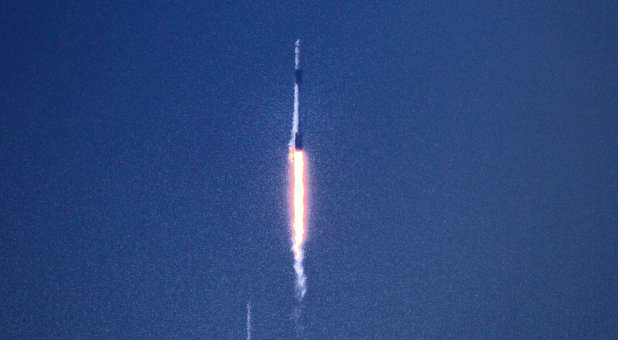The Echo of the Boom Heard in Iran May Only Serve as Warmup for Middle East
Note: This is the first of a two-part story.
In case you missed the explosion, no worry. You may still be hearing its echoes and reverberations for a long time.
This past week, reports within and outside Iran have confirmed a massive explosion deep underground at the Iranian Natanz nuclear facility. Iran claims that Natanz and other facilities like it are just for civilian, nuclear energy use, which they declare is their right. But successful foreign intelligence operations, as well as their own announcement that they will begin enriching uranium to 60%, leave no doubt that their intent is military—and malicious.
All this comes in context of a seeming ongoing exchange of attacks on the high seas, and Iran getting into deeper water than it planned. Some weeks ago, an Iranian ship delivering oil to a Syrian ship created an oil spill that devastated much of Israel’s Mediterranean coast in an act that’s been termed environmental terrorism.
Around the same time, an Israeli commercial ship in the Persian/Arabian Gulf was attacked by suspected Iranian forces. After that, an Iranian vessel anchored off the coast of Yemen for an indefinite period suffered an attack. That ship is reported to be a military outpost of the Iranian Revolutionary Guard.
Israel never took responsibility, but the attack was blamed on Israel all the same. After the explosion at Natanz, another Israeli commercial vessel was attacked in the Gulf of Oman, also attributed to Iran. In total, three Israeli commercial vessels have been attacked recently.
But the depth, literally, and damage caused by the Natanz explosion was unprecedented and has Iran blaming Israel and promising retribution.
There are many questions related to Iran’s threat to retaliate for an act for which they blame Israel, and which maybe Israel had something to do with, but that’s still unproven. If the Iranian threat is real, how, where and when will they do it?
Did the attack on the latest commercial ship suffice for them to be able to claim that they hit back and save face without treading into deeper waters for which they may be unprepared? Will they attempt a virtual cyber-attack? Try to hit Israel physically? Will they target a “soft” Jewish or Israeli target overseas?
All these and others are real possibilities.
Hopefully, as much as they are rattling their nuclear sabers, the Iranians will use good sense. If Israel really was involved in the Natanz explosion, Iran should be well aware that Israel has ability to do much more damage.
Also, it’s estimated that if Israel had a hand in the Natanz explosion, the explosive device may have been in place for years. Maybe a decade or more, waiting for the time that Iran began ramped up operation of their centrifuges as they did before the explosion. Iran should question how many other explosives are placed strategically throughout Iran, ready to go boom, and whether it is prepared for the consequences of another such attack.
For some time, Israel has been engaged in what it calls the “war between the wars.” This has involved what’s publicly claimed by Israel as hundreds of attacks on Iranian and other military targets, particularly in Syria.
By targeting Iranian forces and weapons, or Syrian and other Iranian supported outposts, Israel is “mowing the grass.” So, if there were to be another physical attack on Israel itself, would they do it long distance directly, more forcefully, or would it come from one of its puppets in Yemen, Syria, Lebanon and Gaza?
Use of force from Yemen would be unprecedented but not impossible. Israeli intelligence understands that’s a threat on a new front. Hezbollah has an estimated 150,000 rockets aimed at Israel and the capacity to launch thousands a day.
Israel has made it clear that a major attack from Hezbollah in Lebanon would unleash a response in Lebanon would be devastating because Hezbollah’s weapons are stored in civilian areas. It’s only several months since the huge explosion at the Beirut port for which Hezbollah has been blamed. Taking action could be more damaging than they would be prepared for, even if ordered to do so by their masters in Tehran.
Rockets being fired or other cross-border attacks from Gaza are possible, but the ramifications would be significant. As it does with any rocket attack from Gaza, Israel will strike back, on a limited basis, unless a terrorist rocket causes significant casualties. Palestinian Arab terrorists there may have less to lose because they have long operated on the belief that they win when they inflict casualties in Israel and when Israeli retaliations inflict casualties in Gaza.
But Israel does factor in collateral damage and casualties among the civilian Arab population. Israel’s efforts to reduce civilian casualties in Gaza are well documented from the “knock on the roof” to calling residents of a building that’s about to be hit and the massive drop of leaflets in Arabic warning of pending strikes on terrorist targets, even when “hidden” in civilian areas.
Iran may not care about any of this if they choose to engage their puppets. The question is to what extent their puppets will let their strings be pulled or resist if they worry about the local consequences. {eoa}
Jonathan Feldstein was born and educated in the U.S. and immigrated to Israel in 2004. He is married and the father of six. Throughout his life and career, he has become a respected bridge between Jews and Christians and serves as president of the Genesis 123 Foundation. He writes regularly on major Christian websites about Israel and shares experiences of living as an Orthodox Jew in Israel. He can be reached at firstpersonisrael@gmail.com.
Read articles like this one and other Spirit-led content in our new platform, CHARISMA PLUS.




























































